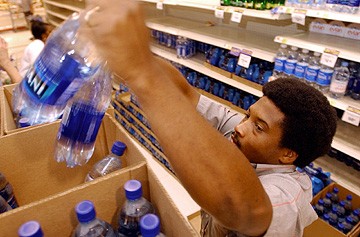
Fortified Water
Water is an essential part of each and every life. Everywhere you look, work, school, the playground, the football field, people are walking around, holding a water bottle like a lifeline. Some health-conscious drinkers will never be seen without one.
But there has been a recent twist to the bottled water drinking trend: fortified water. This new product has been popping up on grocery store shelves, attracting a curious crowd. In June, the makers of Pepsi shelved a new kind of Aquafina water: Aquafina Essentials. The four new flavors of water, Tangerine Pineapple, Citrus Blend, Watermelon and Wild Berry are marketed to those water drinkers who are looking for a little more than their everyday spring water.
Pepsi’s additives to natural water include fructose-glucose syrup, Vitamin B and Vitamin C. Their Watermelon-flavored Aquafina Essential has seven vitamins, including B6, B12, C and E.
Gatorade has had their new “fitness water” marketed for the health conscious person who is tired of drinking plain water and would prefer a beverage with a light flavor and vitamins. The four flavors they offer include Lemon, Orange, Berry and Black Cherry.
Although companies such as Pepsi and Gatorade claim that these new brands of water are healthier and more nutritious, the forty calories per eight-ounce serving in each Aquafina Essential doesn’t seem to add up. With natural water being from nature, the purity no sodium, carbohydrates and added sugars is a guarantee. Each bottle of Aquafina Essentials has ten to eleven grams of carbohydrates, all of which are sugars, and ten milligrams of sodium. Many of these new fortified waters are sold in bottles with misleading labels. One bottle sometimes contains two to two and a half servings. Therefore, one may consume up to 100 calories by drinking water without even being aware of it.
Gatorade’s Propel, however, has set its standard lower. They claim to have only ten calories and three grams of carbohydrates per eight-ounce serving of water. Each bottle also supplies the drinker with 25 percent daily value of vitamin B6.
“They’re just trying to sell one more thing,” first-year Lisel Morris complains. “If people are really health conscious, they won’t drink that stuff. You can’t beat regular water.”








